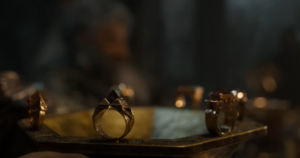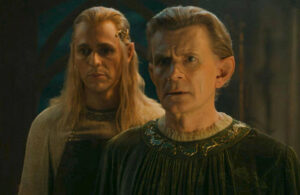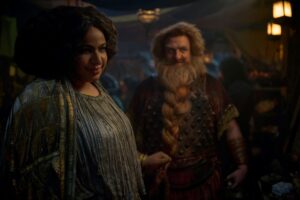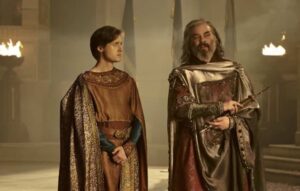MAJOR SPOILERS FOR THE RINGS OF POWER SEASON TWO, EPISODE FIVE AHEAD!
In Middle-earth, pieces of magical jewelry are almost inevitably the catalyst for widespread death and devastation, and in and of themselves are often objects of psychological horror. The Silmarillion is presented as a compilation of legends recounting how several generations of heroes and villains were driven to self-destruction in their relentless pursuit of the Silmarils, three jewels shaped by the legendary craftsman Fëanor. The Hobbit is a whimsical children’s story that abruptly morphs into something much darker when the Arkenstone is introduced, closely resembling a Silmaril in both appearance and narrative function. The Lord Of The Rings follows the quest to destroy the One Ring, which is semi-sentient and does everything in its considerable power to prevent its wearer from wanting to take it off or give it away, much less do harm to it. And Amazon’s The Rings Of Power attempts to piece together the story of how that and nineteen similar Rings came into being; how they were tainted in the making by the Dark Lord Sauron (Charlie Vickers), and how they almost brought all of Middle-earth under his authoritarian rule forever.

The Rings Of Power is the only one of these stories not told in full by J.R.R. Tolkien. A much abridged version of the tale can be found in the Appendices to The Lord Of The Rings, and slightly more detail is given in a short epilogue to The Silmarillion and in a fragmented outline published in Unfinished Tales, but Amazon only bought the rights to The Lord Of The Rings from the Tolkien Estate, so the Appendices are what their writers have to work with: excepting a few stray names exclusive to The Silmarillion and/or Unfinished Tales (like Sauron’s alter ego in Eregion, Annatar) that were apparently the result of separate bargains. Every interaction between characters on the show has been the invention of other minds and hands besides Tolkien’s own. And that’s not necessarily a bad thing, because as I’ve said previously, The Rings Of Power thrives when it’s given free rein.
Nowhere has this been more evident than in the dynamic between Sauron and Celebrimbor (Charles Edwards). In The Lord Of The Rings, all that is said of the second-greatest Elven craftsman after Fëanor (besides having helped construct the West-gate of Khazad-dûm, an event the show covers very briefly) is that he was deceived by Sauron’s fair form and his promise to help the Elves rebuild Middle-earth after the catastrophic wars of the First Age. Together, they forged sixteen Rings of Power, and three Celebrimbor made separately from Sauron. But were the Rings his idea, or Sauron’s? Was Celebrimbor ever suspicious of his partner before the day, it is said, when Sauron first put on the One Ring he had forged alone and the Elves knew they had been betrayed? What, if any, signs of Sauron’s true agenda did he miss or look past nonetheless? What was their relationship? These and other details simply don’t exist.
Yet The Rings Of Power navigates skillfully through the gaps and cracks in the pseudo-historical narrative, weaving an almost unendurably intimate story of one man (well, elf)’s anguishing descent into paranoia under the soothing manipulations of a sociopathic deity that has only a loose basis in the text but is about as quintessentially Tolkienian as anyone could hope to write, evoking the tragedy of Fëanor, inevitably – but also, and arguably even more so, the deeply depressing Tale Of The Children Of Húrin, or Narn I Hîn Húrin, whose sibling protagonists eventually commit suicide after discovering that they had been bewitched by a malevolent dragon into an incestuous relationship with each other. Obviously, not quite the same situation (though the dragon Glaurung, with his ability to mesmerize and deceive, is actually very similar to Sauron), but as The Rings Of Power‘s Celebrimbor begins to wake from the spell Sauron cast on him, learning from his friends in Khazad-dûm that the seven rings he gifted to the Dwarves have malfunctioned horribly in some way, he experiences all the same emotions – most viscerally, a sense of horror and revulsion with himself.
Sauron, still posing as the lovely Annatar, is there at once to guide Celebrimbor gently but firmly through his crisis, assuring the Elven-smith that even though it was his fault the seven rings do not work as intended, together they can make things right by forging more: nine more, to be precise. Sauron’s unwavering composure, in stark contrast to Celebrimbor’s increasing panic and bewilderment, is another classic manipulation tactic, giving Celebrimbor the illusion of something steady to hold onto as his world seems to be falling apart, while simultaneously misleading onlookers to their relationship into believing that Sauron is the sounding board for Celebrimbor’s erratic outbursts. Within their controlled environment, the boundaries of which continue to shrink as Sauron isolates Celebrimbor from his people, the once-powerful elf retains just enough agency for it to seem plausible, even to him, that he is in fact responsible for all his actions over the past several weeks, intensifying his feelings of confusion because he keeps making choices that seem right and they keep backfiring.

Vickers and Edwards, separately and especially together, continue to be the season’s standout performers, with Edwards more than making up for his lack of screentime throughout season one and the first half of season two. His mildness, easily mistaken for meekness, belies his true strength and force of will, which Edwards summons to the forefront of his depiction as the two smiths clash more frequently in episode five. Realizing that he cannot convince Celebrimbor of the necessity of the Nine Rings, Sauron enlists their young pupils to help him forge the Nine in open defiance of Celebrimbor’s orders, all before his very eyes. Sauron is not the smith Celebrimbor is, however, and Celebrimbor eventually feels compelled to intervene and lend them his aid, if only to prevent any of his cherished apprentices from being injured or inadvertently killed. No doubt that was Sauron’s intention, to strongarm the stubbornly virtuous smith into finishing the job they started by cruelly exploiting his love for his people, which Celebrimbor could not hide even if he were trying.
Vickers, meanwhile, begins stripping the already thin layers of humanity out of his character, his eyes becoming colder, his posture more statuesque, and his demeanor more aloof and unkind as the project grinds to a halt just inches away from completion. The almost imperceptible fidgeting of his fingers or the twitch in his jaw whenever the forge is briefly still, and his soulless mimicry of Celebrimbor’s genuine care and concern for the smiths all speak to his growing impatience and willingness to start shedding blood to get what he wants.
I should probably mention Mirdania (Amelia Kenworthy) at this point: the only named smith besides Celebrimbor, she acts as a representative for the whole group, and The Rings Of Power inevitably puts her character through a great deal of emotional and mental abuse on their behalf – but where Celebrimbor and other male victims of Sauron’s manipulation are shown to fall slowly under his spell and are allowed to keep their dignity even in their darkest moments, Mirdania is won over by a single compliment about her physical appearance, rather than her skills, and her role almost immediately reduced to Sauron’s hopelessly smitten, willing plaything. Given that she is, in addition to being the only named smith, the only named female character in Eregion and one of a handful of named female Elves on the show, the decision to utilize her in this manner is an extremely unfortunate one.
The Dwarves weave in and out of Sauron’s plans, mostly impervious to his attempted manipulation of their minds, but not entirely incorruptible. The typically sober and cautious King Durin III (Peter Mullan, who has scoffed at fans who take the show “ridiculously seriously”, but is by no means phoning in his performance) is emboldened by the Ring of Power on his finger: at first making use of the heightened perception it grants him to locate a place in the cavern wall where the Dwarves can safely chip away, permitting a thin beam of sunlight to reach the dark-enshrouded underground city of Khazad-dûm. Of course, because we’re already on episode five of eight, it’s not long before the King’s newfound ability leads him in the opposite direction, deeper into the mountain’s ancient foundations, probing for the untapped natural treasury he knows lies just out of his reach.
Concurrently, his daughter-in-law Disa (Sophia Nomvete) takes a wrong turn in the market and ends up on the shores of a vast subterranean lake (hate when that happens), where she makes an unsettling discovery: the Dwarves may not be alone in Khazad-dûm. Something deep under the city is awake, the force of its breath stirring the waters of the lake. But Disa and her husband Durin IV (Owain Arthur)’s attempts to warn the King prove unsuccessful, so together they devise a plan to prevent him from delving any further. The fiery Nomvete steals most every scene she’s in, but Arthur’s performance is equally impressive this episode, as his character finally stops hiding behind his cantankerous humor and opens up about his complicated feelings towards his father.

Fatherhood is a prominent but understated motif in The Rings Of Power, and the show depicts a wide range of father/child relationships, often complex and tense: you have the Durins double, who are at each other’s throats half the time but still love each other deeply, even if they have a hard time expressing that; Adar (Sam Hazeldine), whose name in Sindarin literally translates to ‘father’, doing what he thinks is best for his adopted children, the Orcs, and inadvertently causing them to resent him; the Silvan Elf Arondir, in many ways Adar’s parallel, struggling to form a connection with the mortal youth Theo, whose mother Arondir loved; and you have Ar-Pharazôn (Trystan Gravelle) and Elendil (Lloyd Owen) in Númenor – two very different men on opposite sides of an ideological divide, who have more in common when it comes to their parenting skills (or lack thereof) than is probably evident at first glance.
That’s not to say they’re equally awful fathers: Pharazôn straight-up does not like his son Kemen (Leon Wadham), and blatantly manipulates him with an empty promise that he’ll tell Kemen what his dead mother foresaw of his future if he agrees to do his dirty work. But Elendil, while he’s a heroic character where Pharazôn is not, is almost as emotionally detached from his children. He loves them, but he doesn’t know how to talk to them, and makes very few attempts (at least that we see). His daughter Eärien (Ema Horvath) is well within her rights to be confused and upset by his actions: he campaigned hard for Númenor to go to war, got her brother killed (so they both think), and now refuses to speak of it, except to spout the vagaries of the Faithful. Unfortunately, she’s had so few scenes this season that her decision to move fully into Pharazôn’s camp and join him in overthrowing the government still feels like a sudden heel-turn, but I get it.
I can’t bring myself to hate Eärien, but Kemen? Well, let’s just say that’s a different story. He may not have willingly ransacked a holy site and intimidated people peacefully praying if it weren’t for his father’s instructions, but goading a man into fighting him, and then killing that man dishonorably by stabbing him in the back after said man spared his life – that was all Kemen’s doing. And it would be bad enough if it were some random Númenórean extra we didn’t know previously, but it’s not: the man in question, Valandil (Alex Tarrant), is an endearing character we’ve known from season one, whom Elendil loved as his own son, and his death comes as a complete shock. The imagery of him bleeding out in Elendil’s arms, while Kemen casually cleans his blade in holy water, cements Kemen as The Rings Of Power‘s worst character – by which I do not mean that Wadham is giving a bad performance, or that the character is poorly-written (underwritten, yes), but rather that he is so despicable he gives Sauron and other, more competent villains on the show a run for their money. He faded into the background in earlier episodes, but no longer.
Episode five, Halls Of Stone, achieves an almost perfect balance between the subplots in Eregion, Khazad-dûm and Númenor that the season as a whole could have stood to replicate. Writer Nicholas Adams, who also wrote the standout sixth episode of season one, Udûn, finds and focuses in on the emotional core in every scene of his precise, yet richly nuanced script; a focus maintained by co-directors Sanaa Hamri and Louise Hooper. Adams will not be returning for the show’s yet-to-be-officially-announced third season, sadly, but this is the quality of writing The Rings Of Power really ought to be matching from here on out (as the second season is now complete, I can say it comes so close as to make little difference in the final three episodes, but falls just a little short).

With this episode, The Rings Of Power rights itself after a short rough patch (short, I say, but two weak episodes still constitute a quarter of the season), and gives us a glimpse of what might have been if the season had been stripped of its slow-burn accessory subplots in Pelargir and Rhûn. Everything falls into place around Edwards’ Celebrimbor, Vickers’ Sauron, and the titular Rings – which are not just props, but protagonists (or antagonists) in their own right, with a degree of sentience and agency. Finally, that’s actually starting to feel like the case.
Episode Rating: 9/10